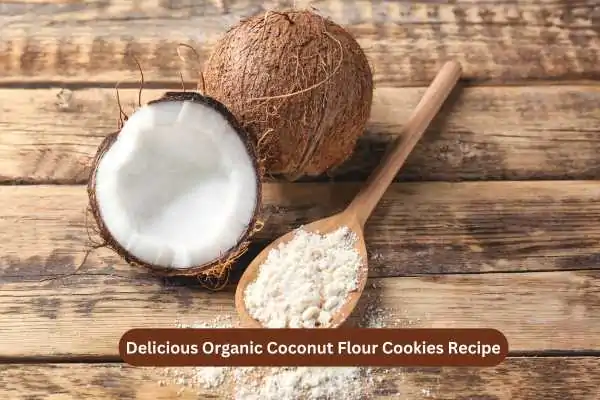In recent years, organic coconut flour has become a popular ingredient across the UK, especially among those seeking healthier alternatives to traditional wheat-based flours. Beyond its gluten-free appeal, coconut flour has a standout benefit: it can significantly improve digestion. Packed with fibre, low in carbohydrates, and rich in nutrients, it offers a natural way to support gut health while still allowing you to enjoy baked goods, smoothies, and other recipes.

This article explores how organic coconut flour can improve digestion, why it’s different from conventional flours, and practical ways to incorporate it into your diet.
What Is Organic Coconut Flour?
Organic coconut flour is made from dried coconut meat that has been defatted and finely ground. Unlike refined flours, it’s minimally processed and retains much of the natural fibre and nutrients found in coconuts. Its light texture, mild sweetness, and versatility make it an excellent choice for baking and cooking.
Being organic also means it’s produced without synthetic pesticides or additives, ensuring a purer option for health-conscious individuals in the UK.
High Fibre Content for Smooth Digestion
One of the main reasons coconut flour is so beneficial for digestion is its exceptionally high fibre content. Just two tablespoons of coconut flour provide around 5–6 grams of dietary fibre, which is more than double what you’d find in the same amount of wheat flour.
How Fibre Helps Digestion:
-
Supports bowel regularity: Insoluble fibre adds bulk to stools, making them easier to pass and reducing constipation.
-
Feeds good gut bacteria: Soluble fibre acts as a prebiotic, nourishing beneficial gut microbes that play a vital role in digestive health.
-
Regulates bowel movements: The balance of soluble and insoluble fibre in coconut flour helps maintain consistent digestion, avoiding both sluggishness and diarrhoea.
Gluten-Free and Easy on the Stomach
For individuals with gluten sensitivities or coeliac disease, wheat and barley-based flours can trigger bloating, cramping, and discomfort. Organic coconut flour provides a naturally gluten-free alternative, making it much gentler on the digestive system.
Even for those without gluten intolerance, reducing gluten intake by incorporating coconut flour can ease digestive strain and promote a lighter, more comfortable gut experience.
Low Glycaemic Impact Supports Digestive Function
Unlike refined flours that spike blood sugar levels, coconut flour has a low glycaemic index. This means it releases glucose slowly into the bloodstream, reducing the risk of blood sugar crashes that often affect digestive function and energy levels. A steady glycaemic response also helps the gut operate more smoothly, avoiding bloating or sluggishness linked to rapid sugar absorption.
Rich in Healthy Nutrients
Coconut flour is not only about fibre—it’s also packed with beneficial nutrients that indirectly support digestion.
-
Medium-chain triglycerides (MCTs): These healthy fats are easier for the body to absorb and convert into energy, easing the digestive load.
-
Iron: Helps maintain healthy oxygen levels in the gut lining, supporting efficient nutrient absorption.
-
Plant-based protein: Adds satiety and helps balance meals, reducing overeating, which can stress the digestive system.
How to Use Organic Coconut Flour in Your Diet
Incorporating coconut flour into your meals is simple and can be done without major changes to your cooking routine.
1. Baking
Use coconut flour in muffins, pancakes, and bread. Keep in mind that it absorbs more liquid than wheat flour, so recipes usually require additional eggs or plant-based binders to achieve the right texture.
2. Smoothies
Add a tablespoon of coconut flour to your morning smoothie. It not only boosts fibre but also thickens the texture, making it more satisfying.
3. Soups and Stews
Coconut flour works as a natural thickening agent, giving soups and stews a rich texture while enhancing their nutritional profile.
4. Energy Balls or Bars
Mix coconut flour with nut butter, honey, and seeds to create homemade energy snacks that are easy to digest and gut-friendly.
Tips for Digestive Comfort
While coconut flour is excellent for digestion, introducing too much too quickly can overwhelm the gut, especially for those unaccustomed to high fibre intake. Here are some tips:
-
Start small: Begin with 1–2 tablespoons per day and gradually increase.
-
Stay hydrated: Fibre works best when accompanied by plenty of water.
-
Combine with other flours: For smoother textures in baking, mix coconut flour with almond or oat flour.
Why Choose Organic?
Choosing organic coconut flour ensures that you’re avoiding potential pesticides and chemicals that could disrupt gut balance. Organic certification also means the product is produced sustainably, supporting both your health and the environment.
Final Thoughts
Organic coconut flour is more than just a trendy gluten-free ingredient—it’s a natural digestive aid that supports bowel regularity, nurtures gut bacteria, and provides essential nutrients. Its high fibre content, gluten-free profile, and gentle impact on blood sugar make it a valuable addition to a balanced diet.
By incorporating coconut flour into your meals, you can enjoy better digestion while still savouring the foods you love. Whether you stir it into smoothies, bake it into bread, or sprinkle it into soups, this versatile flour offers a simple way to support your digestive health naturally.

